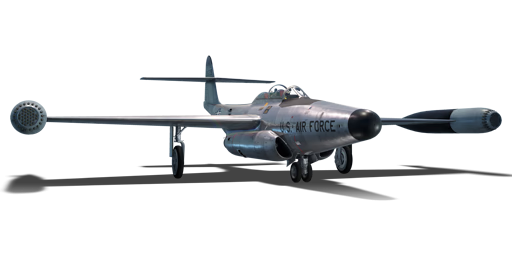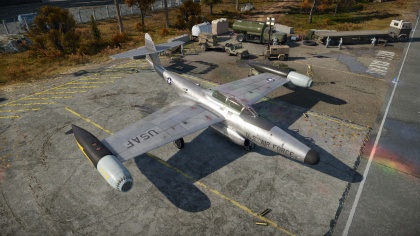Difference between revisions of "F-89D"
(Created page.) |
(→Pros and cons) (Tag: Visual edit) |
||
| Line 28: | Line 28: | ||
'''Pros:''' | '''Pros:''' | ||
| + | |||
| + | * Fearsome rocket armament | ||
| + | * Decent high speed maneuverability | ||
| + | |||
* | * | ||
'''Cons:''' | '''Cons:''' | ||
| + | |||
| + | * No gun armament | ||
| + | * Rockets are inaccurate | ||
| + | * Not very maneuverable at low speeds | ||
| + | |||
* | * | ||
| Line 46: | Line 55: | ||
* ''reference to the series of the aircraft;'' | * ''reference to the series of the aircraft;'' | ||
* ''links to approximate analogues of other nations and research trees.''--> | * ''links to approximate analogues of other nations and research trees.''--> | ||
| + | |||
* [[F-89B]] - Cannon-armed variant of the fighter. | * [[F-89B]] - Cannon-armed variant of the fighter. | ||
| Line 53: | Line 63: | ||
* ''encyclopedia page on the aircraft;'' | * ''encyclopedia page on the aircraft;'' | ||
* ''other literature.''--> | * ''other literature.''--> | ||
| + | |||
* [[wt:en/news/6371-development-f-89b-and-f-89d-scorpion-jet-bros-en|[Development<nowiki>]</nowiki> F-89B and F-89D Scorpion: Jet Bros]] | * [[wt:en/news/6371-development-f-89b-and-f-89d-scorpion-jet-bros-en|[Development<nowiki>]</nowiki> F-89B and F-89D Scorpion: Jet Bros]] | ||
{{USA jet aircraft}} | {{USA jet aircraft}} | ||
Revision as of 01:35, 15 September 2019
Contents
Description
The F-89D is a premium rank V American jet fighter
with a battle rating of 6.7 (AB), 7.0 (RB), and 7.3 (SB). It was introduced in Update 1.91 "Night Vision".
General info
Flight performance
Describe how the aircraft behaves in the air. Speed, manoeuvrability, acceleration and allowable loads - these are the most important characteristics of the vehicle.
Survivability and armour
Examine the survivability of the aircraft. Note how vulnerable the structure is and how secure the pilot is, whether the fuel tanks are armoured, etc. Describe the armour, if there is any, and also mention the vulnerability of other critical aircraft systems.
Armaments
Suspended armament
Describe the aircraft's suspended armament: additional cannons under the wings, bombs, rockets and torpedoes. This section is especially important for bombers and attackers. If there is no suspended weaponry remove this subsection.
Usage in battles
Describe the tactics of playing in an aircraft, the features of using vehicles in a team and advice on tactics. Refrain from creating a "guide" - do not impose a single point of view, but instead, give the reader food for thought. Examine the most dangerous enemies and give recommendations on fighting them. If necessary, note the specifics of the game in different modes (AB, RB, SB).
Pros and cons
Summarise and briefly evaluate the vehicle in terms of its characteristics and combat effectiveness. Mark its pros and cons in the bulleted list. Try not to use more than 6 points for each of the characteristics. Avoid using categorical definitions such as "bad", "good" and the like - use substitutions with softer forms such as "inadequate" and "effective".
Pros:
- Fearsome rocket armament
- Decent high speed maneuverability
Cons:
- No gun armament
- Rockets are inaccurate
- Not very maneuverable at low speeds
History
Almost immediately after WWII, the Nothrop Corporation began developing an experimental jet fighter-interceptor to meet the new requirements for that class of aircraft. The American interceptor’s primary targets were supposed to be Soviet bombers, so the projected model’s flight characteristics and armament had to meet this objective. At first the two-seater twin-engine jet was developed to have a rather interesting four gun turret. This turret was to be mounted on the aircraft’s nose and could fire on targets either automatically or manually along a vertical plane either forward, up, down or, in some cases, backward. However, when the experimental model of the aircraft was ready, the turret still hadn’t undergone testing yet, so the military decided to install traditional static frontal guns on it, as well as HVARs on the wing pylons. It was with this loadout that the Scorpion F-89A and F-89B went into service. The armament was switched exclusively to rockets somewhat later. To make the change to rockets, the designers implemented an interesting solution: Mighty Mouse unguided rockets were installed on the front of the wing-mounted fuel tanks in such a way that the rocket and fuel sections of this part of the design were separated by a fireproof barrier. This also made it possible to install heavier, more destructive HVARs under the wing. The F-89D or “rocket” version of the Scorpion went on to become the most widespread version of the aircraft in the US air force – 682 of them were manufactured.
- From Devblog
Media
Excellent additions to the article would be video guides, screenshots from the game, and photos.
See also
- F-89B - Cannon-armed variant of the fighter.
External links
| USA jet aircraft | |
|---|---|
| Fighters | |
| F9F | F9F-2 · F9F-5 · F9F-8 |
| F-80 | F-80A-5 · F-80C-10 |
| F-84 | F-84B-26 · F-84F · F-84G-21-RE |
| F-86 | F-86A-5 · F-86F-25 · F-86F-2 · F-86F-35 |
| F-89 | F-89B · F-89D |
| F-100 | F-100D |
| F-104 | F-104A · F-104C |
| F-4 | F-4C Phantom II · F-4E Phantom II · F-4J Phantom II · F-4S Phantom II |
| F-5 | F-5A · F-5C · F-5E · F-20A |
| F-8 | F8U-2 · F-8E |
| F-14 | F-14A Early · ▄F-14A IRIAF · F-14B |
| F-15 | F-15A · F-15C MSIP II · F-15E |
| F-16 | F-16A · F-16A ADF · F-16C |
| Other | P-59A · F2H-2 · F3D-1 · F3H-2 · F4D-1 · F11F-1 |
| Strike Aircraft | |
| FJ-4 | FJ-4B · FJ-4B VMF-232 |
| A-4 | A-4B · A-4E Early |
| A-7 | A-7D · A-7E · A-7K |
| AV-8 | AV-8A · AV-8C · AV-8B Plus · AV-8B (NA) |
| A-10 | A-10A · A-10A Late · A-10C |
| F-111 | F-111A · F-111F |
| Other | A-6E TRAM · F-105D · F-117 |
| Bombers | |
| B-57 | B-57A · B-57B |





